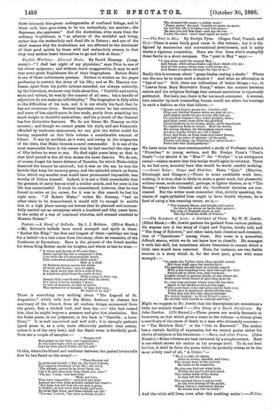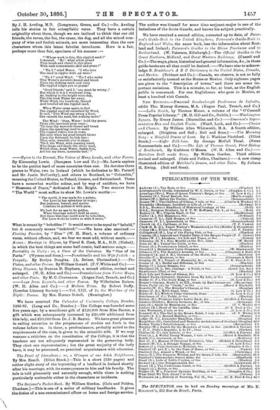POETRY.—A Sheaf of Ballads. By J. J. Britton. (Elliot Stock.)
—Mr. Britton's ballads have much strength and spirit in them. "Bother the King," the first and longest of them—perhaps too long for a ballad—is a tale taken from the story, often so romantic, of the Northmen at Byzantium. Mite is the picture of the Greek maiden for whom King Bother sends his knights, and whom at last he wins :—
'A vision and dream of life and bliss : Sweet carved lips for a conqueror's kiss, rips with the red pomegranate heart,
That somewhat pouted a little apart ; Hair as a fleck Of Hyblean honey across the white Of brow and bosom ; eyes as night, Yea, dark moist eyes with a core of fire, A wondrous glint from the soul's desire, With a sting in their ray. Beauty that roused and dazed with its sheen.
For never a fairer woman I ween, In tent of peasant, on dais of queen, Was harboured or housed ; or man had seen, By night or by day."
There is something very striking about "The Legend of St. Augustine," which tells how the Saint, desirous to cleanse the sanctuary of the Church from all unclean things, summoned from the grave, first a wicked lord, and then the cur( who had cursed him, that he might impose a penance and give him absolution. But the finest poem, in our judgment, in the book is " Carrella : a Love. Story." It is well conceived and well told ; it is strongly pathetic (good prose is, as a rule, more effectively pathetic than poetry, unless it is of the very best), and the blank verse is decidedly good. Here are a couple of samples :—
" Danger still Had power to stir him, ever languid else, As the hunt-bugle stirs an aged steed Laid by with placid fodder till his end."
Or this, where the friend and mediator between the parted lovers tells bow he has fared on his errand :—
"Then flaming out In pride and wrath—' But oh, the honhd show, The sugared falsehood of his life,' she cried, 'The wicked, cursed lie he lived—how, sir, Can I do else than hate him, think you, now ?' 'Oh, no,' I said, 'not hate him.'
'Well, not hate, That were impossible,'—and here she wept Against her will, then proudly curbed her tears- ' Not hate, but tell him all our past is gone, Is broken, as yen wave that broke just now : Re-form that wave, and then rebuild our life.' *Yet see,' I cried, 'the wave re.forms itself—
The element the same—a nobler wave.'
'Peace, peace,' she said, trouble no more, no more.
Go tell him life is broken,—not love gone—
Be Hare you tell him that —and say we two Under the stars—must meet again no more.'"
—The Poet in May. By Evelyn Pyne. (Kegau Paul, Trench, and Co.)—There is some fairly good verse in this volume ; but it is dis- figured by mannerism and conventional prettinesses, and it sadly Wants a vigorous censorship. Here are four lines which exemplify these faults in a short compass. The "poet in May" says :—
"I sine alone amid the scented May ; And dream, while grasadilades east their shade o'er me ; And all the young sweet year swift kisses me, And flames a rapture through the lips of me !"
Really this is nonsense about "grass-blades casting a shade." Where can the sun be to make such a shadow ? And what an affectation is "lips of me !" Still, there are indications of better things,—e.g., in "Leaves from Mary Merivale's Diary," where the contest between nature and the religious feelings that counsel asceticism is vigorously portrayed. But here, too, there is far too much ornament. A woman, torn asunder by such contending forces, would not adorn her musings in such a fashion as this that follows :—
"Dmrer and dearer grows he; closelier still Cling our thrilled fingers when we part at eve ; And clearer grows his gre it soul, like the sea On windless slimmer days, when purples, blues, And faint sweet roses show the glorified Clond-shadows on its breast, white, swift transfused To rapturous flush of colour. How his words, His woven rhymes, his blossoming eweet verse Awaken depths within ms, till I stand Dizzy and faint, as from some sick-sweet dream, And half my sense of mission—of the path, Thorny and steep, my bleeding feet must tread— Fades into fair cloud-pastures."
We have more than once recommended a study of Professor Ayrton's "Firmilian" to young writers, and Mr. Evelyn Pyne's "Poet's Death"—(or should it be "Miss I" for " Evelyn " is an ambiguous name)—makes us sure that this recipe would again be salutary. There is, we feel sure, material here that would be worth careful working. —Sweet Briar : Songs and Sketches. Front "Quiz." (Menzies, Edinburgh and Glasgow.)—There is some creditable work here, nothing, it is true, that is likely to make a great mark, but pleasantly written verse, more successful, perhaps, in lighter themes, as in "The Bazaar," where the Oriental and the Occidental varieties are con- trasted. But the writer must remember that, strictly speaking, the stanza of eight-syllabled lines ought to have doable rhymes ; he is fond of using a less exacting metre, as in,— " The trumpet blares, and knight and squire Go down the street on barbs that prance ; The rose of England meets in war
The lily from the fields of France."
—The Romance of Love : a Garland of Verse. By W. H. .Tewitt. (Elliot Stock.)—Mr. Jewitt gathers his garland from various gardens. He weaves into it the story of Cupid and Psyche, briefly told, and "The Song of Solomon," and other tales, both classical and romantic, that of " Tannhauser " among them. His verse is a somewhat difficult stanza, which we do not know how to classify. He manages it with fair skill, but sometimes allows blemishes to remain which a little care would have removed. Here, for instance, are two feeble stanzas in a story which is, for the most part, given with some strength :-
"So epake the Father stern, then upright reared
Hie ivory staff upon the marble floor The penitent shrunk back as roughly seared With a hot branding-iron, then through the door
Pawed out in silent woe, and evermore
Looked round in anxious doubt, as one whose eye
Seeks some loved friend of ages long gone by.
So some lone prisoner whose long life has been Spent in the darkness of a prison-cage, While years have come and gone and he bath seen Youth pass to manhood, manhood into age, When cast out into day, cannot assuage His weary longing no loved friend is near ; He shrinks 'mid crowds in solitude and fear."
Might we suggest to Mr. Jewitt that his descriptions are sometimes a little too warmly tinted P—The Story of a Death Certificate. By John Gordon. (376 Strand.)—These poems are mostly fantastic or humorous, as that which gives a name to the volume—a doctor gives a certificate of the cause of death to a man who ultimately recovers— or "The Hairless Heir," or the "Ode to Marwood." The author has a certain facility of expression, but we cannot piaise either his choice of subjects or his treatment.—Rain, and other Poems. (John Kensit.) —Some volumes are best reviewed by a simple extract. Here is one which shows the author at his average level. To do our best for him, it shall be from the poem which he probably wishes to be the most widely read of all, "A Critic :"— " He is a critic of repute, Alive to colour, warmth, and tone;
The classic ways of the pursuit He holds to be outgrown.
He also can find out what lurks
Within the poet's art and mind : The verbal study of his works Is thus left far behind.
The method brave is yet as rude As the first feeling of the youth, Whom fiction's characters delude To dream they live in truth."
And the critic still lives, even after this scathing satire !—Fables,
By J. H. Aveling, M.D. (Isongmans, Green, and Co.)—Dr. Aveling tells his stories in fair octosyllabio verse. They have a certain originality about them, though we are inclined to think that our old Mends, the raven, the fox, the crane, the dog, and all the mixed com- pany of wise and foolish animals, are more interesting than the new characters whom this latest fabulist introduces. Here is a fair, perhaps more than fair, specimen of his manner :— "'Whose work is this, this rippled sand ?' I shouted. 'Ho! what artist grand Plies brush and chisel in this place With such consummate skill and grace?'
'Tie I !' cried Water. '1 who lave The sand in ripples with iny wa.e.• 'Tis I!' cried Wind. "Tis I who make This Water's wavelets bound and break Upon the shifting sand, and raise The rippled ridges you an praise.'
'Good friends,' said I, 'one must be wrong ;' But which it was I wondered long. As, basking in the bright noon-day, The tide took Water far away, While Wind, the busybody, fanned And levelled all the rippled sand.
When Water came again to find The rippled sand all smoothed by Wind, It said,'This Wind can sweep a floor, Can smooth the sand, but nothing more.'
The Wind 'Stay, Water! hold thy peace, Thine idle insolence pray cease ; 'Xis true thy wavelets bound and break Upon the sparkling sand to make The rippled ridges rise in rows, Bat only when my good breath blows Upon thy flattened, foolish face ; Then only, wavelets o'er it chase. "Cis I, the Wind, with canning hand, Who shape and elsade the silver sand, Whilst thou,..weak Water, feeble fool,
Art but my slave, insensate tool.' "
—Hymn to the Eternal, The Voices of Many Lands, and other Poems. By Kinneraley Lewis. (Sampson Low and Co.)—Mr. Lewis aspires to be the patriot bard of more countries than one. He devotes three poems to Wales, two to Ireland (which he dedicates to Mr. Parnell and Mr. Justin McCarthy), and others to Scotland, to "Columbia,' meaning the United States, to Poland, Greece, and Switzerland. These have a somewhat warlike colour, and by way of antidote, we have "Blossoms of Peace," dedicated to Mr. Bright. Two stanzas from "The World" must suffice to show Mr. Lewis'a merits :—
"The world, it was made for a palace, For Love in her splendour to reign; But jealousy, hatred, and malice Combine to pollute it with pain.
We look for an age to be golden. When blessings untol I shall be ours' , But these blessings could now be beholden, For Love w.eits to crown us with timers."
What is meant by" beholden ?" It would seem to be equal to" beheld," but it commonly means "indebted."—We have also received :— Fleeting Fancies, by "Elan" (W. H. Bier), a volume of ordinary verse, without offence, and, we fear we must add, without merit.
Avena : Musings in Rhyme, by Flavel S. Cook, M.A., D.D. (Nisbet), in which the best things are some half-comic, half-serious songs.— Partiality in Unity ; or, a View of the Universe. By "One of its Parts." (Wyman and Sons.)—Punchinelio and his Wife Judith : a Tragedy. By Evelyn Douglas. (A.. Driver, Chelmsford.)—The Vision, and other Poems. By William Gerard. (F.V.White and Co.)— Stray Rhymes, by Duncan D. Hepburn, a second edition, revised and enlarged. (W. H. Allen and Co.)—Translations from Victor lingo, and other Poets. By M. C. Cheyennes. (Kogan Paul, Trench, and Co.) —Lays from Legends, and other Poems. By Wilhelmina Baines. (W. H. Allen and Co.)-21. Modern Titan. By Hobert Duffy. (London Literary Society.)--Vol. XIII. of In the Watches of the Night : Poems. By Mrs. Horace Dobell. (Remington.)





































 Previous page
Previous page